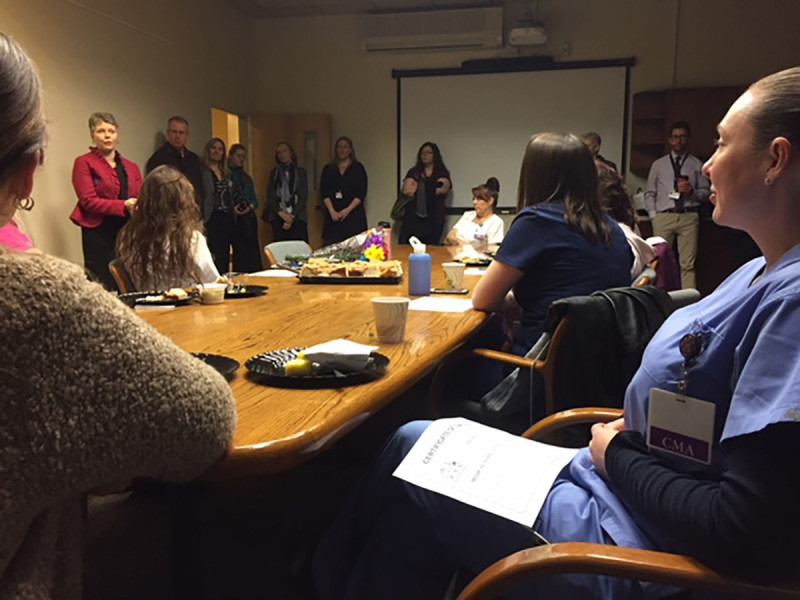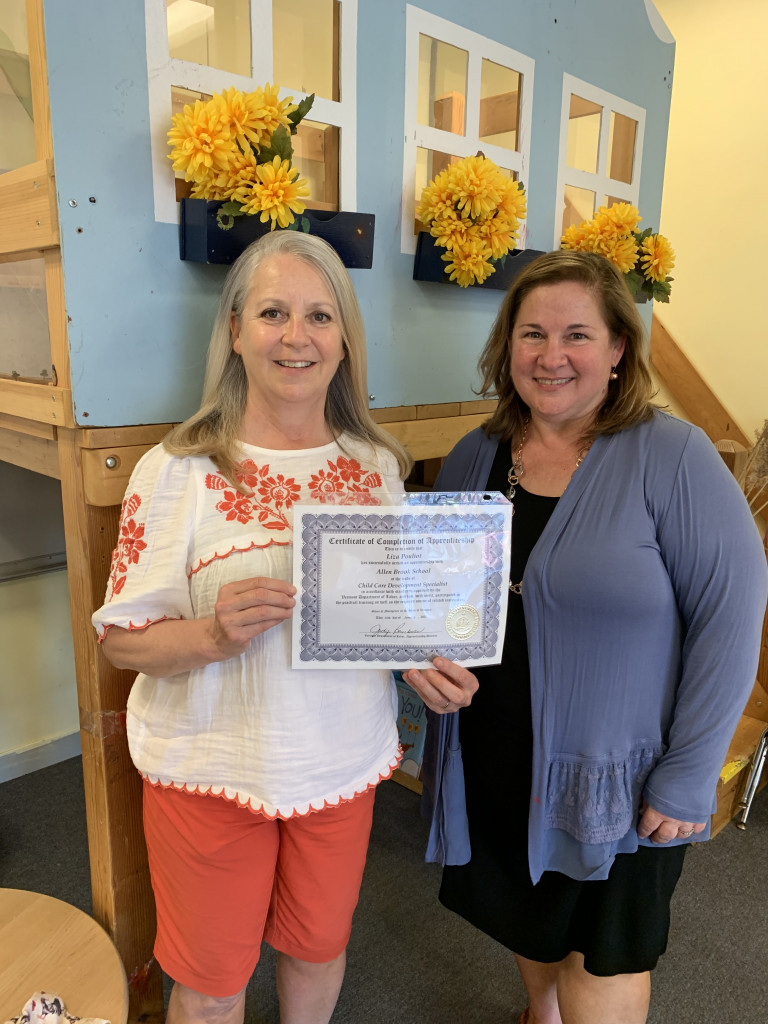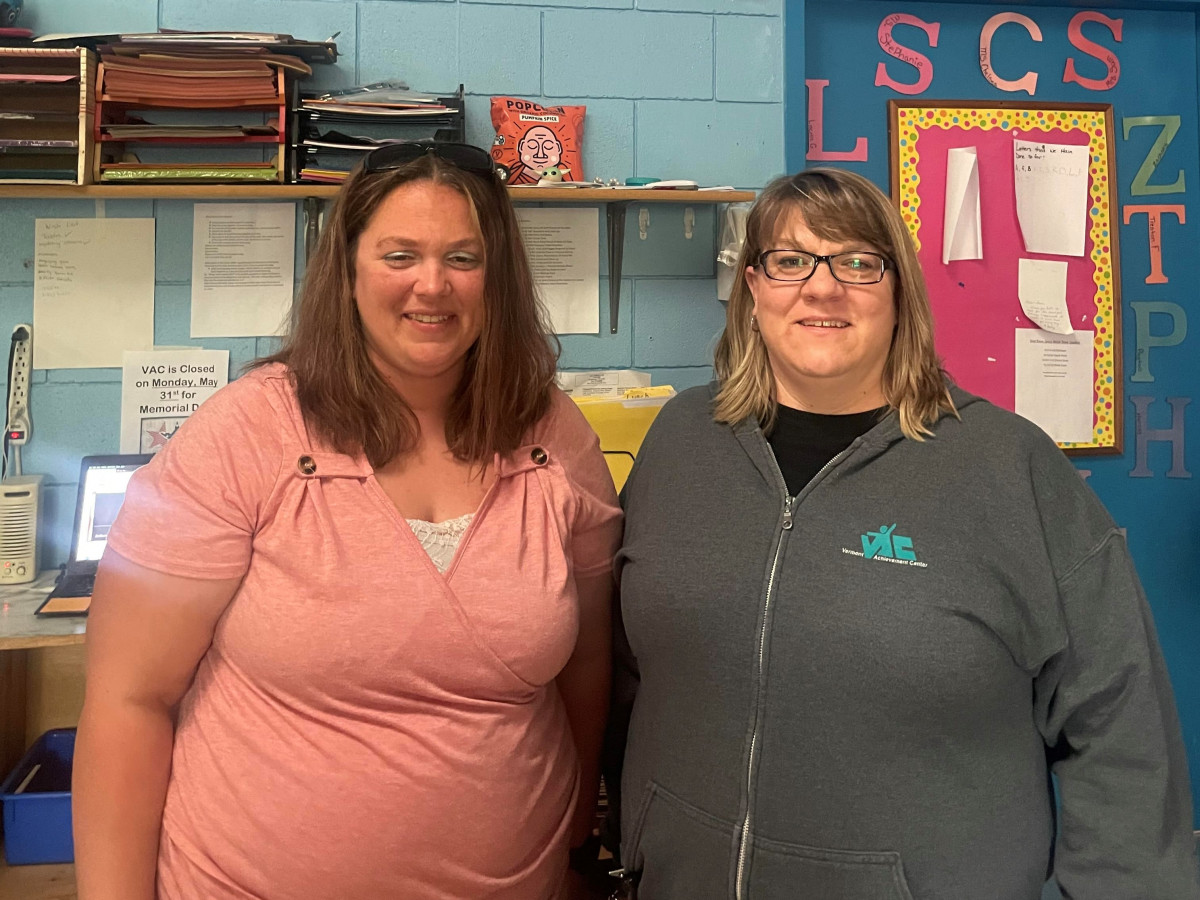
For Stephanie Paradis, the Early Childhood Apprenticeship Program was a stepping stone in her career. “I wanted to pursue a career in early childhood education because I love to teach children things that they’ll carry for life,” Stephanie said. “I also wanted to help children explore and succeed, and witness their incredible achievements.”
The Vermont Early Childhood Apprenticeship Program is offered by the Vermont Association for the Education of Young Children (VTAEYC), in collaboration with the Vermont Department of Labor, and provides an opportunity for continued education and experience for Vermont’s early childhood educators. A close partner with VTAEYC and the Department of Labor, CCV provides the program’s requisite college courses.
This month, four Vermont early childhood educators completed the program, including Paradis and fellow graduate Liza Pouliot.
Advancing a Career
Stephanie Paradis started out at the Vermont Achievement Center in 2009 as a substitute teacher and moved up to the assistant teacher position in 2015. She had her eyes set on becoming the lead teacher, but needed further education before she could make this jump. The director at the Vermont Achievement Center, who also became her mentor, suggested the Early Childhood Apprenticeship Program.
For Stephanie, the greatest benefit of the program was gaining the education she needed to become a lead teacher. She also appreciated the experience she received from her classes, as well as working with a mentor. Additionally, Stephanie said “it was the best financial option for me.” The early childhood apprenticeship program is funded by TEACH (Teacher Education and Compensation Helps), a national scholarship program offering debt-free opportunities for early childhood education apprenticeship and degree programs through VTAEYC. The scholarship allowed Stephanie to complete the apprenticeship debt-free.
Taking classes and finding time for homework was hard at first, as she had been out of school for a while, was still working, and was taking care of her family. But, she “adjusted quickly and enjoyed being a student and learning.” The CCV environment helped with this adjustment. “[CCV] is local, the classes were at night, and I felt very comfortable because the classes were so small,” she said.
Now, after completing the apprenticeship program, Stephanie is the lead teacher of the 4-5-year-old preschool room at the Vermont Achievement Center. “The Childhood Education Apprenticeship helped me by understanding the children and the curriculum better. It helped me become a better teacher. I would definitely recommend this program to anyone – it was a great experience and I learned a lot from it.”
Updating Education

Liza Pouliot believes that “every child deserves an opportunity to learn and to [have you] meet them wherever they need you.” That’s why she chose to work in early childhood education.
When Liza started her family, she knew that she didn’t want to leave her children in a child care facility. “I also wanted to support my family and provide some income,” Liza said. “So I decided to open up a child care center.” At her home in Massachusetts, she took care of a small number of children, including her own.
During this time Liza grew a relationship with a child with special needs, whom she took care of from the age of six weeks. When this child started preschool Liza was “at the table advocating for her at the public school.” This support continued until the child was in middle school, when Liza was recognized by the school’s special education director and was asked if she would like a job working in the public school. She said yes.
Years later, Liza moved to Vermont, and was still working in the public school setting when regulations for child care in Vermont changed. She now needed a formal, higher level of education, so she started the Early Childhood Apprenticeship Program, including classes at CCV. “I learned so much through the six classes that were available to me,” Liza said. The classes provided her with the “extra tools” she needed to work with families and children. Additionally, she says the apprenticeship helped because “it gave me the sense of ‘you don’t always know what you think you know.’” Instead, “You can always grow and get better if you’re willing to open your eyes and ideals to whatever insights there are available.”
Liza currently works at the Allen Brook school in Williston as a paraprofessional, working both one-on-one with students and in the general classrooms. “I would recommend the apprenticeship because it makes you a better teacher…it gives you an opportunity to understand children better,” she said.
She has considered furthering her education at CCV with either a certificate or associate degree because of her belief that “children coming into the system need more. For me, I think it’s important to try to gain as much knowledge [as possible], and how to best support children with demanding needs.”
About the Apprenticeship
With locations throughout Vermont, CCV was a logical choice for partnership in the Apprenticeship program. “CCV was originally chosen because we have a statewide presence and because we’re offering early childhood education courses throughout the state,” said CCV Associate Academic Dean Diane Hermann-Artim. Students also benefit from the flexibility of CCV classes. Apprentices who complete the program can also apply the credits they’ve earned toward a CCV childcare certificate or associate degree in early childhood education.
The apprenticeship program is made up of multiple components: six or seven college courses (depending on the level of previous education the apprentice has), 4,000 hours of supervised on-the-job training at a sponsoring child care center, and participation in community-based training. Apprentices must work at least 30 hours per week and work with a qualified mentor, and their sponsoring program (regulated child care employers) allocates three hours per week toward completion of coursework.
Brenda Schramm, the TEACH and Vermont Early Childhood Apprenticeship manager, says, “it’s quite a robust program. The value for the student is that they get to take really wonderful courses at CCV, support from their mentor, from TEACH, and academic advisors at CCV. They have really great wrap-around support to be successful in their courses, and then at the same time they have that really nice one-on-one support from their mentor in their classroom as they’re learning.”
Graduates of the program like Liza and Stephanie are growing their careers while at the same time benefiting the Vermont workforce, according to Brenda. “The apprenticeship program is creating really well educated early childhood educators who get to choose their individual path,” she said. “They have higher qualifications and can fill roles in classrooms. That’s a great thing.”
To learn more about the Vermont Early Childhood Apprenticeship Program, visit vtaeyc.org/vecap. To get involved in the program, email brenda.schramm@vtaeyc.org.



